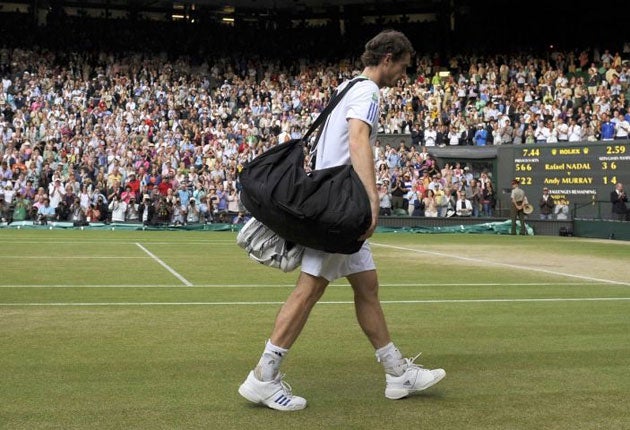Out! Andy Murray's latest exit shows he's the right man - at the wrong time
Britain’s No 1 has the misfortune to be playing his best tennis during a golden age for the men's game

Your support helps us to tell the story
From reproductive rights to climate change to Big Tech, The Independent is on the ground when the story is developing. Whether it's investigating the financials of Elon Musk's pro-Trump PAC or producing our latest documentary, 'The A Word', which shines a light on the American women fighting for reproductive rights, we know how important it is to parse out the facts from the messaging.
At such a critical moment in US history, we need reporters on the ground. Your donation allows us to keep sending journalists to speak to both sides of the story.
The Independent is trusted by Americans across the entire political spectrum. And unlike many other quality news outlets, we choose not to lock Americans out of our reporting and analysis with paywalls. We believe quality journalism should be available to everyone, paid for by those who can afford it.
Your support makes all the difference.For a happy hour a sporting nation dared to dream.
On a sun-dappled evening in a green corner of south-west London Andy Murray was playing the tennis of his life, bidding to end Britain's greatest sporting hex and reach the final of Wimbledon. Murray, the tall angular Scot, took the first set against the brilliant Spaniard Rafael Nadal, but then reality cruelly intruded and, although it took another two hours to end, the outcome had long since been apparent.
Murray saved one match point, but it only postponed the painful finale for a few moments; Nadal won 5-7, 6-2, 6-2, 6-4 and will play Novak Djokovic in tomorrow's final. He had gambled, admitted a downcast Murray afterwards, on playing "high-risk tennis" and his boldness did not pay off. "I went for it today. Maybe I should have been more cautious," he said.
So for home hopes the wait goes on and 1936 remains a date etched painfully in the history of British sport – the last time a Briton, the great Fred Perry, won in SW19. Then there is 1938, the last time a Briton, Bunny Austin, reached the final.
Murray had entered the match with his most encouraging campaign behind him. He is the best player Britain has produced since Perry's era – a level above Tim Henman, the Englishman who established this near-annual British sporting tragedy of semi-final failure – but he has still not proved himself good enough to master a player of the calibre of Nadal, the defending champion.
The relentless Nadal will be judged as one of the best players the sport has seen, so for Murray to be beaten is no disgrace, even if his error count was too high for comfort. Sport can be crushingly simple sometimes: Murray made mistakes, Nadal did not. In the pivotal second set, Nadal did not make a single error.
This was Murray's third successive semi-final here. Defeat at this stage has become an immense frustration – to the 24-year-old and his fans – and the fact that he won a set for the first time in a Wimbledon semi is of no consolation. He has reached three Grand Slam finals, twice in Australia and once at the US Open, and lost them all and there are mounting fears that he will always be not quite good enough.
Murray has the misfortune to be playing in the middle of what is coming to be regarded as a golden age of the men's game. Tomorrow Nadal will face the Serb Djokovic, who has replaced his opponent as No 1 in the world. Then there is Roger Federer, a six-times Wimbledon winner and the other power in the game, who did not even make the last four here.
Afterwards Murray was asked whether he is good enough to take that final step. "It's tough, really tough," said Murray. "I'm giving it my best shot. That's all I can do. It's a difficult question – I don't know."
Murray, beneath a white baseball cap, began in a manner that raised hopes from here to Dunblane, his home town, that something special was about to be served up. He launched aces and sped across the court. In the 12th game he broke Nadal and took the set. A Centre Court crowd that had been noticeably nervous roared its approval.
That was the high. Nadal is a remarkable athlete as well as tennis player and he ran down shot after shot. The second set flashed by in 36 minutes as the errors began to creep into Murray's game under pressure from his opponent. Murray sent a forehand long at a key moment and Nadal pounced to begin a run of seven games in a row. The Spaniard described it as the turning point.
The third set saw Nadal further tighten his hold on the contest and, although Murray tried to rally in the fourth, the momentum was with the defending champion, who has now won 20 successive matches at this event.
"I feel sad for Andy," said Nadal afterwards. Murray, an admirably resolute character, is not someone to seek sympathy, but it took a heart of stone not to agree with the man from Mallorca.
Join our commenting forum
Join thought-provoking conversations, follow other Independent readers and see their replies
Comments